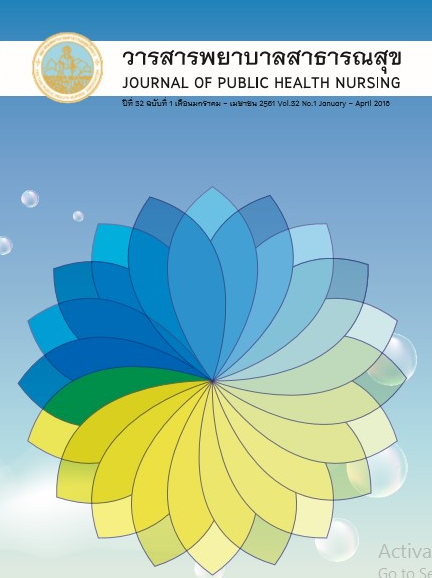Participatory Empowerment to Promote Adaptive Behavior to Control Blood Sugar Levels of Diabetic Clients
Keywords:
Diabetes, Roy Adaptation Model, Empowerment, Blood Sugar LevelsAbstract
Uncontrolled diabetes can cause complications and death. This Participatory Action
Research studied perceived adaptation, the effects of promoted adaptations, and blood
sugar levels after empowering clients to change using the Roy Adaptation model in Nongo
District Health Promoting Hospital, Nakhon Sawan Province. The sample of clients included
fifteen diabetes patients with involvement of caretakers, community personnel and health
personnel. A qualitative and quantitative questionnaire and an in-depth interview methodology
were employed from September 2016 to April 2017. The questionnaire was tested for validity
(Content Validity Index: CVI = 0.77) and reliability (Cronbach alpha coefficient = 0.84). Statistical
analysis was completed on personal data, health problems, and perceived adaptation.
Comparison of perceived adaptation and blood sugar levels before and after the participatory
empowering process for promoting adaptive behavior was completed by paired T-test. Role
of caretaker, community personnel, and health personnel was analyzed by content analysis.
The results showed that diabetic clients had significantly increased understanding of
means of adaptation after participating in the process of empowerment. Also, mean levels
of physical health factors were significantly improved (P < 0.05). In addition, mean blood
sugar levels decreased after participating in the process of empowerment using the Roy
Adaptation Model (P < 0.05).
Further long term studies observing physiological improvements due to behavioral
changes of diabetic patients are recommended.
Downloads
Published
How to Cite
Issue
Section
License
บทความที่ตีพิมพ์และแผนภูมิรูปภาพถือเป็นลิขสิทธิ์ของวารสารพยาบาลสาธารณสุข (Thai Public Health Nurses Association)







